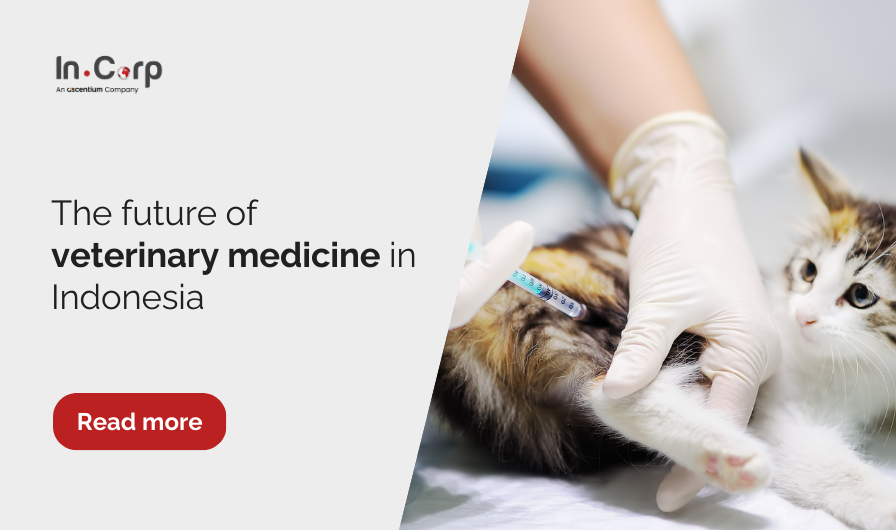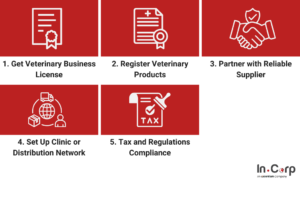Indonesia’s veterinary medicine industry is not just growing, it’s evolving rapidly, indicating significant and promising growth potential. The surge in pet ownership, rising demand for livestock healthcare, and improved veterinary regulations have made the sector an attractive investment opportunity.
How can businesses seamlessly enter this thriving market? This article will explore Indonesia’s veterinary landscape, future opportunities, key challenges, and essential insights for companies looking to expand in this dynamic and strategically important industry.
Indonesia’s veterinary medicine market landscape
Market research indicates that Indonesia’s animal supplement industry is growing strongly. Valued at US$128.41 million in 2023, the market is expected to reach US$177.85 million by 2027, reflecting a CAGR of 8.65%.
Pet supplements lead the sector with a market value of US$150 million, followed by livestock supplements, veterinary pharmaceuticals, and animal feed additives.
The industry’s expansion is fueled by the rising number of pet owners and a growing demand for organic veterinary medicines.
With fewer local competitors, international companies are tapping into the demand. For example, Chr. Hansen introduced its poultry gastrointestinal probiotics in Indonesia in March 2022, marking a strategic move into the Indonesian market.
Why invest in Indonesia’s veterinary medicine market
Indonesia’s veterinary supplement industry presents a lucrative opportunity for business expansion. Here’s why you should tap into this growing market:
Rising Pet Ownership
The growing middle class has increased Indonesia’s pet ownership, creating a strong demand for preventive healthcare, vaccinations, and veterinary medicine.
Expanding Livestock Industry
As Southeast Asia’s largest poultry and cattle producers, farmers need high-quality medicines and supplements to keep their livestock healthy and meet government health regulations.
Government Support & Incentives
Indonesia simplifies market entry with easy business licensing and product registration. Investment incentives in animal healthcare, pharmaceuticals, and research are also driving industry growth.
High Demand for Natural and Organic Products
The growing demand for organic, antibiotic-free, and probiotic veterinary medicines presents businesses with a valuable opportunity to capitalize on this market trend.
Limited Local Competition
Despite the market potential, Indonesia has relatively few domestic veterinary pharmaceutical manufacturers. This gap has attracted global veterinary businesses looking to establish their presence in the country.
Future opportunities in the veterinary medicine market
Indonesia’s veterinary sector is rapidly growing, offering new business opportunities driven by rising demand for pet care and livestock health. Several key areas are set to shape the industry’s future, including:
1. Digital Veterinary Services and Telemedicine
Technology is transforming veterinary care, with telemedicine, pet health apps, and online consultations becoming more popular. Businesses investing in AI-driven diagnostics and remote healthcare solutions can establish a strong market presence.
2. Sustainable and Eco-Friendly Products
As consumers and farmers become more aware of environmental impact, there is a rising preference for natural, organic, and plant-based veterinary supplements.
3. The Rise of E-Commerce
Online sales platforms are making it easier for farmers and consumers, especially those in remote and rural areas, to access a wide range of veterinary medicine.
4, Aquaculture Products Growth
As fish and aquatic farming expands, the demand for aquaculture-specific supplements and veterinary solutions is increasing. Farmers are seeking specialized healthcare products to improve aquatic livestock health.
Read more: Indonesia’s Investment Opportunities in Food Supplement Business
Key market barriers for businesses
Indonesia’s veterinary industry faces several challenges, including complicated licensing and regulations. Businesses must work with many government agencies to get licenses and product approvals. This process often causes delays and increases costs, which is incredibly challenging for new and small businesses.
Simplifying these processes could encourage more companies to enter the market. Another significant issue is high dependence on imports, which results in higher prices and supply chain disruptions.
Since most veterinary medicines come from foreign suppliers, businesses struggle with price fluctuations and long shipping times. Additionally, Indonesia’s price-sensitive market makes it challenging to sell premium veterinary products, as many consumers prefer cheaper alternatives.
To stay competitive, businesses must find a way to balance affordability and quality.
How to start a veterinary medicine business in Indonesia
Starting a veterinary business in Indonesia requires proper licensing, product registration, and a strong market strategy. Here’s the step-by-step guide to getting started:
1. Get a Veterinary Business License
For businesses operating in the veterinary field, obtaining a Veterinary Business License (SIKH) from the Ministry of Agriculture, which plays a crucial role in setting and enforcing standards for the industry, is essential for legal compliance. This license ensures that the business meets the necessary regulations and standards within the industry.
2. Register Veterinary Products
In Indonesia, the approval of medicines and supplements is crucial for ensuring their safety and quality before they are sold to consumers. The Indonesian Food and Drug Authority (BPOM) and the Directorate General of Livestock and Animal Health (Ditjen PKH) oversee this process, which involves submitting detailed product information and undergoing rigorous testing.
Read more: How to register your product for BPOM in Indonesia
3. Find a Reliable Supply Chain
For businesses that depend on imported medication, collaborating with reliable local suppliers, such as [Supplier A] or [Supplier B], can significantly reduce costs and minimize delays in receiving products. This strategy enhances efficiency and ensures a more consistent supply chain, ultimately benefiting the overall operation.
4. Set Up a Veterinary Clinic or Distribution Network
Businesses focused on pharmaceutical distribution should partner with veterinary clinics, pet stores, and livestock farms to expand their reach. Veterinary clinics, on the other hand, must select a strategic location and equip their facilities with essential medical tools for smooth operations.
5. Comply with Tax and Business Regulations
All businesses need to obtain a tax ID (NPWP) and adhere to the relevant regulations, including securing import permits, acquiring halal certification if applicable, and complying with labor laws. This ensures legal operation and facilitates smooth business practices.
Establish your hassle-free veterinary business in Indonesia
Expanding into Indonesia’s veterinary market requires proper licensing and product registration, which can be challenging without expert guidance. Whether importing animal supplements or distributing pet medicines, following local regulations is crucial for smooth operations and success.
InCorp Indonesia (An Ascentium Company) simplifies the process, helping you start and grow your veterinary business with expert support:
- Product Registration: Get your products approved quickly and legally before distribution.
- Business License: Secure the required license without delays to stay compliant.
Contact us today to see how we can help your veterinary business thrive!
Get in touch with us.
What you'll get
A prompt response to your inquiry
Knowledge for doing business from local experts
Ongoing support for your business
Disclaimer
The information is provided by PT. Cekindo Business International (“InCorp Indonesia/ we”) for general purpose only and we make no representations or warranties of any kind.
We do not act as an authorized government or non-government provider for official documents and services, which is issued by the Government of the Republic of Indonesia or its appointed officials. We do not promote any official government document or services of the Government of the Republic of Indonesia, including but not limited to, business identifiers, health and welfare assistance programs and benefits, unclaimed tax rebate, electronic travel visa and authorization, passports in this website.




